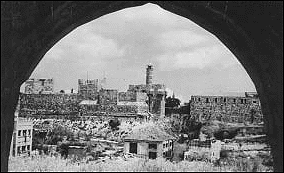|
|
| Director, Script, Photography, Narration: Ron Havilio Editing: Tor Ben-Mayor Sound: Jacqueline Havilio, Jane Stewart Producer, Source: Ron Havilio, Jacqueline Havilio Simtat Hagivah 4, Ein-Karem, Jerusalem 95744, ISRAEL Phone: 972-2-6412491 / Fax: 972-2-6431726 ISRAEL / 1997 / English, Hebrew / Color 16mm / 358 min |
Ron Havilio was born in Jerusalem in 1950. Until the age of 18 he lived with his family in Paris, Istanbul and Yaounde, following his father's diplomatic postings. Returning to Jerusalem, he completed his university studies, practiced photography and worked in construction specializing in the renovation of old houses. In 1984-85 Havilio filmed and edited a two-hour travel diary on Super 8. Never screened, this film was the beginning of his own, personal film language. Work on Fragments Jerusalem began in 1986. Today, Havilio teaches art history, photography and film at the Jerusalem Film and Television School and the Jerusalem Cinematheque. He also heads the Aikido Institute of Jerusalem. |
 |
|
|
From antiquity to the present, Jerusalem is a city that displays many faces. People from all round the world come to make pilgrimages to this land, a land sacred for many religions. It may be said that the city of Jerusalem, with its historically precious architectural styles, is itself a work of art. What kind of meaning does Jerusalem hold - this place that is so important in world politics? This question is an unending source of curiosity. Director Ron Havilio has tried to document his native land, Jerusalem.
In this seven part history, an image of the city begins to emerge
from the history of Palestine before the founding of the State
of Israel, from Havilio's own family history, and from the many
photos by contemporary Jerusalem photographer Werner Braun. For Havillo, Jerusalem's past and present are indistinguishable
from those of his family. Filming his town Jerusalem becomes synonymous
with documenting his own family's history. Subjectivity and objectivity.
The individual and society. During the 10 year period spent making
the film, the chasm between these contrasts was splendidly bridged
by the family's deep and transcendent love. Put another way, this
history of Jerusalem crosses time and space to act like a mirror;
thus the spectator is forced to reflect and to wonder what the
meaning of family and home really is. This is the universal question
that we are asked to confront. Spending six hours with this film
is a meditation on the pursuit of lasting human happiness. |
|
|
|
|
|
Director's Statement In my childhood Jerusalem was divided, cut off by the barbed-wire borders, concrete walls, hatred and incomprehension. The heart of the city, around Jaffa Gate, became a frightening no-man's land. As an adult, I sought to understand the world into which I was born. I felt the need to dig into the past, to follow the traces of my family; their private search for happiness in a violent, changing city. I chose the personal path in filmmaking, filming like a painter or a photographer, recording my environment. It was like fighting back oblivion--fixing images, faces, stories, fragments of life that would otherwise have been erased from memory. I made this film for my daughters, for my country--but I believe at the same time, that the more private and local a film is, the more universal is its reach. Each of us may have a unique trajectory in this world, but we share the same transitory human condition. Showing the film in Japan--the first time outside my country--is a small miracle to me. through the years I have drawn much from culture. My film benefitted greatly from it. Thank you from the bottom of my heart. |
|
